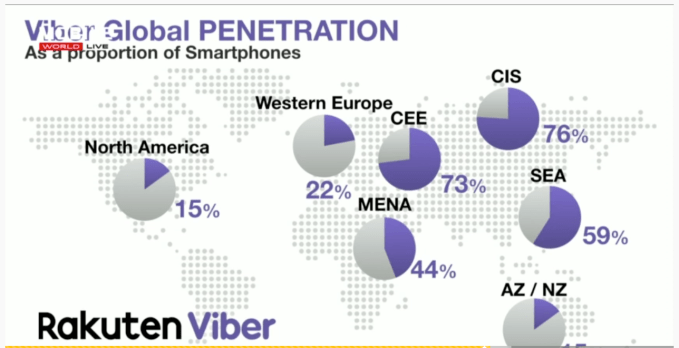Messaging apps have seen a surge of popularity in recent years as people seek ways to communicate more directly than on social networks. But they also have been adding large group chat options into the mix, to give a more social experience on those messaging platforms.
Now messaging app Viber is introducing the biggest group chat of them all. In a bid to drive more usage and bring in more users to the app, Viber is launching a service called Viber Community, with group “limits” of up to 1 billion members — that is, limited only by the number of people registered on Viber itself, which, it says, now has passed the 1 billion mark.
Members of the groups will be able to interact with comments and reactions, and group administrators will be able to monetize the streams, tapping into a network of app partners and the larger e-commerce and media business of Rakuten, which owns Viber (and is known as the Amazon of Japan).
The company is expected to officially announce Viber Communities tomorrow. However, Hiroshi “Mickey” Mikitani, the CEO of Rakuten, pre-announced the details during his keynote at Mobile World Congress on Tuesday (with a video of it posted earlier today here).
The monetizing and engagement features look like they might work similarly to those on Viber’s Public Chats and Public Accounts, where users have been able to follow personalities or brands and can interact in the stream in certain scenarios (for example, if the personality at the center of the chat is already a contact), and chat administrators can monetize the experience with ads and other features.
Communities, it seems, can be around specific people, too, but are geared more toward specific topics and interests.
Viber Communities is the latest iteration in the trend of “super” group messaging — outsized chatrooms where members come to chat, or just listen into other’s chatter, on one topic or another. Limits for chat groups vary by platform. On Facebook, it is 150; LINE’s is 200; WhatsApp’s is 256; WeChat’s is 500; and Telegram touts 100,000.
To the uninitiated, these large group chats might sound gimmicky — wouldn’t 100,000, or even 256, just be a cacophony? It seems, however, that if other chat networks are an indication, the most popular and successful of these mega group chats become useful feeds for people around special interests, and at best end up running along the lines of the “90-9-1” rule (respectively lurkers; intermittent contributors; heavy contributors). Still, 1 billion users could make for a pretty noisy 1 percent.
Mikitani said one of the reasons why we haven’t seen groups as big as Communities introduced before is because it’s “technically demanding” to create such large groups where people can follow, engage and moderate the chat. Communities will partly get around this by giving more controls to administrators and moderators (not unlike Groups on Facebook) to help manage the conversation.
The Community chat that Mikitani used to preview the feature — a conversation between him and Gerard Pique, the Spanish footballer (Rakuten also sponsors Barcelona’s football team) — may not be the greatest example of what this would look like at scale. For now, you can join, but you can’t engage with the two participants, except to “like” their comments.
Viber’s launch of Communities comes at a key moment for Rakuten.
The company is now gearing up to bid for a license to become a full-fledged mobile operator in Japan (today it runs the country’s biggest MVNO, in partnership with NTT DoCoMo). It has built up a vast network of services around e-commerce, e-books (through Kobo) and video streaming and financial services that it’s looking to cross-leverage to grow. It is planning its own cryptocurrency, Rakuten Coin, to help spend money across its various services, and Communities becomes one way of doing that, potentially cross-selling some of these services in Rakuten’s monetization play.
Viber’s launch of Communities comes at an interesting time for the app, too.
Once in the running alongside the likes of WhatsApp to be a leader in the global messaging market, since getting acquired by Rakuten in 2014 for $900 million, Viber hasn’t been very forthcoming about its active user base. Instead, it has focused on how many people currently have the app on their device, which today numbers just over 1 billion. (As a point of comparison, WhatsApp noted in January that it had passed 1.5 billion monthly active users.)
But onstage in Barcelona, Mikitani revealed some statistics about current usage by geography, which finally sheds some more light on where Viber is and isn’t being used today.

Viber — as those in the U.S. who might be asking, What’s Viber? might guess — hasn’t really been able to break into markets where Messenger and other messaging apps already dominate. In the U.S., it only has 15 percent penetration and in Western Europe its penetration is a mere 22 percent. (“Penetration” in its definition is referring to people who actively use the app in each country, the company told us.)
But in other markets it says it has done better. It has a 73 percent penetration in Central and Eastern Europe and 76 percent in Russia; 59 percent in Southeast Asia; 44 percent in the Middle East/North Africa; and 45 percent in Australia/New Zealand.
Could all that change? Given the popularity of the large group chat features of the other messaging apps, Viber could be hoping this launch will drive more active usage of the app, and maybe new users. By essentially creating Communities around interests and giving them the ability to be as big as the app’s own user base, it gives Viber (and Rakuten) a play at presenting itself less as a messaging app, and more as a social network.






























Comment